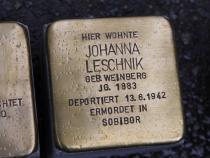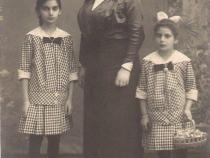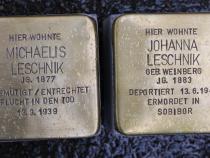Location
Badstraße 44
District
Gesundbrunnen
Stone was laid
07 March 2018
Born
14 January 1883 in Wriezen
Deportation
on 13 June 1942
to
Sobibor
Murdered
June 1942 in Sobibor
Johanna Weinberg was born on 14 January 1883 in Wriezen on the River Oder. At an unknown point in her younger years she moved to Berlin, as did a brother and a sister of hers. Records show that by the beginning of 1905 she had met her future husband in Berlin. In January that year, when she was just 22, she married Michaelis Leschnik, a watchmaker who had opened his own optician’s and jeweller’s shop on Bad Straße in Wedding one year previously. It is likely that the marriage was celebrated according to Jewish rite as well as at Wedding registry office.
Their first daughter, Irene, was born promptly in November 1905. Three years later, Johanna Leschnik gave birth to her second daughter, Käthe Julie. There is no record of Johanna Leschnik having a job. But Michael Leschnik’s businesses prospered and the family lived comfortably even without financial contributions from her. By the late 1920s, Michael Leschnik had bought an apartment building near their home, co-owned another tenement in Wedding, and opened a second shop in Tiergarten.
In 1928 Johanna Leschnik’s daughter Irene married Felix Zimmt, an optician, and in 1931 her daughter Käthe married Leopold Simon, a watchmaker. Both sons-in-law no doubt cooperated with her husband on business and provided mutual assistance. When their daughters had moved out, Johanna and Michaelis Leschnik moved to a comfortable 3-room apartment at Bad Straße 44, where they had a library and a piano.
When the Nazis came to power, life for the Leschniks’ changed completely. Consequent to the Nazis’ boycott of Jewish businesses, launched in April 1933, and general hostility towards Jews, Michaelis Leschnik was forced to close his optician’s and photographer’s shop at Beussel Straße in Tiergarten and sell it – far below its actual value – in September 1933. One month later, in October 1933, the Leschniks’ daughter Irene fled with her husband to Palestine. In 1937 she returned to Berlin to celebrate Michaelis Leschnik’s 60th birthday and stayed from April to July. It was to be the last time that Johanna Leschnik saw Irene. “On 9 November 1938 Herr Leschnik’s entire business was completely wrecked and gutted. He was forced to sell the building at Buttman Straße (…) and could only look on as everything he had built up over the last 35 years, by hard work and the utmost thrift, was destroyed,” wrote their daughters’ friend for the compensation proceedings. The watchmaker’s shop in Schöneberg run by their son-in-law Leopold Simon was also looted and demolished; the Simons fled with their two children to the Leschniks in Wedding and moved in with them on Bad Straße. Then Michaelis and Johanna Leschnik, like all Jewish people, were required to pay the Nazis’ “Jewish property tax” – in their case, 7,500 Reichmarks, a sum which they no longer had at their disposal. A short time later, Michaelis Leschnik suffered a heart attack which he narrowly survived. According to a letter Johanna wrote to her son-in-law in Palestine, her husband was terribly afraid of emigrating as he could not imagine being able to pay their upkeep any more. Exhausted, humiliated and despairing, Michaelis Leschnik took his own life on 13 March 1939 in the nearby River Panke. Johanna had her husband buried in the Jewish Cemetery in Weißensee. We can only imagine how severe a blow this must have been to Johanna, not least because she now had to meet the demand for 7,500 Reichmarks alone. Johanna Leschnik was forced to hand in all her valuables and give up the apartment buildings intended to be her old-age security. In her letter to her son-in-law she wrote how depressed she was about the situation and that her prospects of escape were dwindling. But she did not stop trying to obtain a visa for Palestine and paid 872 Reichmarks to the Jewish Community as a deposit on the journey. However, in July 1939 she wrote to her daughter Irene: “…I never seem to get a certificate”. Later in 1939, Johanna Leschik had to vacate her apartment at Bad Straße 44 and live as a subtenant in a so-called “Jews’ home” at Wilhelmsaue 5 in Wilmersdorf. But she still did not give up hope of leaving Germany for Palestine, where she planned to open a guesthouse. She even bought a gas cooker to take with her. “My mother lived in hope of being able to get out of Germany,” her daughter Irene wrote in 1971 in a statement for the compensation authority. Johanna Leschnik had the furniture she wanted to take abroad stored with the haulage company Gebrüder Hertling under the name ‘Werner Jährling’. The monthly fee was paid by a Frau Jährling, who had worked for Johanna Leschnik’s sister for several years as a household help. It seems she and Johanna had become friends, but it is also evident from the compensation file that Herr Jährling misappropriated some of the furniture.
In 1941 Johanna Leschnik was conscripted to forced labour and assigned a job in the Franz Grimm paper factory in Mitte. In January 1942 she suffered another severe blow. Facing imminent deportation, her sister Erika Weinberg took her own life. Johanna’s daughter Käthe arranged the burial in the Jewish Cemetery in Weißensee. In May 1942 Johanna Leschnik was forced to move again to a different “Jews’ home” – this time in the familiar Bad Straße. Perhaps she even knew Barkowsky, the Jewish owner of the apartment at number 32. Here, she lived in one room for a monthly rent of 30 Reichmarks. Just six weeks later, on 13 June 1942, she was deported to Sobibor, where she was murdered on arrival three days later.
Her daughter Käthe was arrested in summer 1942 for organizing a hiding place for a young resistance fighter involved in the Herbert Baum group. She was deported from prison to Auschwitz. After the war, her sister Irene recognized her on a photo of the liberation of Bergen-Belsen concentration camp, but she was never seen again. Käthe’s husband Leopold Simon and their children were also taken to Auschwitz and murdered on arrival. Johanna’s brother Heinrich Weinberg (born 1 November 1885 in Wriezen on the River Oder) suffered the same fate. He was deported to Auschwitz with his wife Hedwig (née Gotthilf) in March 1943 and murdered.
Their first daughter, Irene, was born promptly in November 1905. Three years later, Johanna Leschnik gave birth to her second daughter, Käthe Julie. There is no record of Johanna Leschnik having a job. But Michael Leschnik’s businesses prospered and the family lived comfortably even without financial contributions from her. By the late 1920s, Michael Leschnik had bought an apartment building near their home, co-owned another tenement in Wedding, and opened a second shop in Tiergarten.
In 1928 Johanna Leschnik’s daughter Irene married Felix Zimmt, an optician, and in 1931 her daughter Käthe married Leopold Simon, a watchmaker. Both sons-in-law no doubt cooperated with her husband on business and provided mutual assistance. When their daughters had moved out, Johanna and Michaelis Leschnik moved to a comfortable 3-room apartment at Bad Straße 44, where they had a library and a piano.
When the Nazis came to power, life for the Leschniks’ changed completely. Consequent to the Nazis’ boycott of Jewish businesses, launched in April 1933, and general hostility towards Jews, Michaelis Leschnik was forced to close his optician’s and photographer’s shop at Beussel Straße in Tiergarten and sell it – far below its actual value – in September 1933. One month later, in October 1933, the Leschniks’ daughter Irene fled with her husband to Palestine. In 1937 she returned to Berlin to celebrate Michaelis Leschnik’s 60th birthday and stayed from April to July. It was to be the last time that Johanna Leschnik saw Irene. “On 9 November 1938 Herr Leschnik’s entire business was completely wrecked and gutted. He was forced to sell the building at Buttman Straße (…) and could only look on as everything he had built up over the last 35 years, by hard work and the utmost thrift, was destroyed,” wrote their daughters’ friend for the compensation proceedings. The watchmaker’s shop in Schöneberg run by their son-in-law Leopold Simon was also looted and demolished; the Simons fled with their two children to the Leschniks in Wedding and moved in with them on Bad Straße. Then Michaelis and Johanna Leschnik, like all Jewish people, were required to pay the Nazis’ “Jewish property tax” – in their case, 7,500 Reichmarks, a sum which they no longer had at their disposal. A short time later, Michaelis Leschnik suffered a heart attack which he narrowly survived. According to a letter Johanna wrote to her son-in-law in Palestine, her husband was terribly afraid of emigrating as he could not imagine being able to pay their upkeep any more. Exhausted, humiliated and despairing, Michaelis Leschnik took his own life on 13 March 1939 in the nearby River Panke. Johanna had her husband buried in the Jewish Cemetery in Weißensee. We can only imagine how severe a blow this must have been to Johanna, not least because she now had to meet the demand for 7,500 Reichmarks alone. Johanna Leschnik was forced to hand in all her valuables and give up the apartment buildings intended to be her old-age security. In her letter to her son-in-law she wrote how depressed she was about the situation and that her prospects of escape were dwindling. But she did not stop trying to obtain a visa for Palestine and paid 872 Reichmarks to the Jewish Community as a deposit on the journey. However, in July 1939 she wrote to her daughter Irene: “…I never seem to get a certificate”. Later in 1939, Johanna Leschik had to vacate her apartment at Bad Straße 44 and live as a subtenant in a so-called “Jews’ home” at Wilhelmsaue 5 in Wilmersdorf. But she still did not give up hope of leaving Germany for Palestine, where she planned to open a guesthouse. She even bought a gas cooker to take with her. “My mother lived in hope of being able to get out of Germany,” her daughter Irene wrote in 1971 in a statement for the compensation authority. Johanna Leschnik had the furniture she wanted to take abroad stored with the haulage company Gebrüder Hertling under the name ‘Werner Jährling’. The monthly fee was paid by a Frau Jährling, who had worked for Johanna Leschnik’s sister for several years as a household help. It seems she and Johanna had become friends, but it is also evident from the compensation file that Herr Jährling misappropriated some of the furniture.
In 1941 Johanna Leschnik was conscripted to forced labour and assigned a job in the Franz Grimm paper factory in Mitte. In January 1942 she suffered another severe blow. Facing imminent deportation, her sister Erika Weinberg took her own life. Johanna’s daughter Käthe arranged the burial in the Jewish Cemetery in Weißensee. In May 1942 Johanna Leschnik was forced to move again to a different “Jews’ home” – this time in the familiar Bad Straße. Perhaps she even knew Barkowsky, the Jewish owner of the apartment at number 32. Here, she lived in one room for a monthly rent of 30 Reichmarks. Just six weeks later, on 13 June 1942, she was deported to Sobibor, where she was murdered on arrival three days later.
Her daughter Käthe was arrested in summer 1942 for organizing a hiding place for a young resistance fighter involved in the Herbert Baum group. She was deported from prison to Auschwitz. After the war, her sister Irene recognized her on a photo of the liberation of Bergen-Belsen concentration camp, but she was never seen again. Käthe’s husband Leopold Simon and their children were also taken to Auschwitz and murdered on arrival. Johanna’s brother Heinrich Weinberg (born 1 November 1885 in Wriezen on the River Oder) suffered the same fate. He was deported to Auschwitz with his wife Hedwig (née Gotthilf) in March 1943 and murdered.






